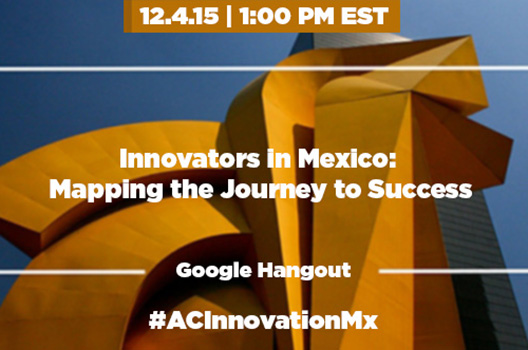 Over the past few years, Mexico’s leaders have undertaken massive legislative and constitutional reforms aimed to uplift and transform the country. Besides significant improvements already materializing in the energy and telecommunications sectors, the new government initiatives such as the creation of an Entrepreneur Institute (INADEM) and a focus on supporting small to medium businesses, are rapidly shifting Mexico’s image to one now widely associated with innovation.
Over the past few years, Mexico’s leaders have undertaken massive legislative and constitutional reforms aimed to uplift and transform the country. Besides significant improvements already materializing in the energy and telecommunications sectors, the new government initiatives such as the creation of an Entrepreneur Institute (INADEM) and a focus on supporting small to medium businesses, are rapidly shifting Mexico’s image to one now widely associated with innovation.
While data shows Mexico has the largest percentage of new businesses as a total base, the mere creation of new companies does not translate into prospering ventures. To unravel the challenges and to identify the next steps to success, the Adrienne Arsht Latin America Center at the Atlantic Council is spearheading a large project with leading Mexican innovators to discuss the complexities of the innovation industry in the so-called “New Mexico.”
The project’s findings will be presented at a conference in Mexico City in April 2016. The Center kicked off the series of events by hosting the first Google Hangout session on December 4, 2015, on the topic of Innovations on the Health sector, with participation from: Marcus Dantus, CEO of Startup Mexico, the country’s first innovation campus for entrepreneurs; Hugo Moreno, CEO of Ver de Verdad, a company aiming to provide high-quality, affordable eyeglass options; and Pablo Salazar, managing partner at NXTP Labs, Latin America’s most active acceleration and early-stage funding company.
View the full Google Hangout Call:
Marcus Dantus presented three main themes for successful entrepreneurship: education, efficiency, and creativity. There is an “incredible opportunity to educate entrepreneurs into creating and growing companies – how to be more relevant and to transcend” commented Dantus. Better business education can also mitigate the Mexican business “efficiency problem” – that explains why business do not thrive despite the nation’s long work hours. Additionally, innovators should be incentivized to increase creativity to help address large-scale problems. Dantus defined a creativity push as one that creates products and services that can solve larger problems and not just personal ones.
Partnerships Matter
A benefit for Mexico’s entrepreneurs is the increasing support in social- good oriented ventures. The country’s government and private sector have created new partnerships to support innovations in technology.
As a word of advice for starting businesses, Pablo Salazar emphasized that “who you choose as a partner matters.” Creating a successful business is much more than just obtaining capital investment; the working relationship should also include a mentorship culture and a trend of “giving back”. Mexico’s goal is to continue the “Generous Cycle” where successful entrepreneurs return to share their experiences with those entering new business. When asked what the best decision-making factor for choosing the right investor is, Mr. Salazar advises to “go with your gut feeling.”
Mexican innovators rely on financial support from the private sector and their commitment to match investments provided by the government. Therefore, as more resources become available, and risk aversion levels in Mexico can be tolerated, more people will enter the game resulting in more success stories in matches, explained Dantus.
A win-win situation for investment partnerships should be a process that translates an invention into a good or service which creates added value for society that costumers are willing to purchase.
An Example of Success
Hugo Moreno shared with the audience his success story of “Ver de Verdad” by explaining the process of tapping into a market that has both public and private sector interest. His company model consists of providing free eye examination and low-cost glasses to low-income individuals, while being a product of entrepreneurial funding. “Success,” Moreno explains, is not just “selling at a low price, but creating a market”.
This company has become a replicable model to follow for innovation that can empower those who need it most. “There are many services that can provide large benefits at a low cost,” stated Moreno, and “there’s a lot of opportunity of providing quality health services in Mexico”. Once capital is not a restriction, what are the next steps to success? Moreno highlighted that there is a large sum of capital “out there” ready to invest in projects, entrepreneurs just have to be strategic in creating good business models, understand the market, and execute that model creatively.
Public Policies and Innovation
What are the public policies that can boost innovation? The Mexican government has already taken a proactive role in promoting entrepreneurship and innovation, however there is much work pending in guaranteeing competitiveness and long-term prosperity.
Members of the audience raised excellent discussion points about the male domination in the field as well as the challenges for young innovators. The Mexican government is currently supporting innovations for further women entrepreneurial participation – and Hugo Moreno believes it is only a matter of time until there is a fair gender balance. Additionally, there are programs which focus on the youth, such as: teaching young girls to cloth, robotics, and effective after-school programs. As a result, “students don’t just think of graduating and getting a job, but instead about creating a company,” said Marcus Dantus.
The participants all agreed that this is a great moment in Mexico for businesses… not only to start them, but to invest in them as well. The lessons learned from these sessions on Mexican innovation will be shared in a publication authored by Arturo Franco, forthcoming in spring 2016.
